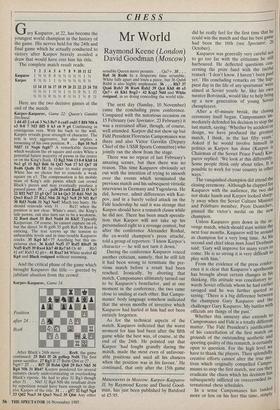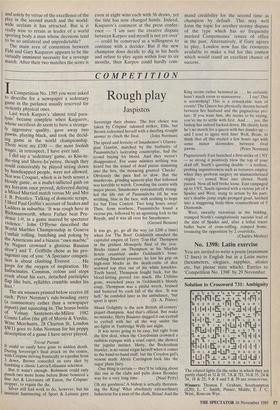CHESS
Mr World
Raymond Keene (London) David Goodman (Moscow)
Gary Kasparov, at 22, has become the youngest world champion in the history of the game. His nerves held for the 24th and final game which he actually conducted to victory after Karpov bravely avoided a draw that would have cost him his title.
The complete match result reads: Here are the two decisive games at the end of the match: Karpov-Kasparov, Game 22: Queen's Gambit Declined.
1 d4 d5 2 c4 e6 3 Nc3 Bel 4 cxd5 exd5 5 Bf4 Nf6 6 e3 0-0 7 Nf3 Bf5 8 h3 c6 9 g4 Continuing in courageous vein. With his back to the wall, Karpov reveals great strength of character. The text is very aggressive, but also implies a loosening of his own position. 9 . . . Bg6 10 Ne5 Nfd7 11 Nxg6 fxg6!? A remarkable decision which weakens the e6 square and cedes White a potential future majority of pawns in the centre or on the King's flank. 12 Bg2 Nb6 13 0-0 Kh8 14 Net g5 15 Bg3 Bd6 16 Qd3 Na6 17 b3 Qe7 18 Bxd6 Qxd6 19 f4! In order to make progress White has no choice but to concede a weak square on e3. The compensation is his mobile mass of King's side pawns which can crowd Black's pieces and may eventually produce a passed pawn. 19 . . . gxf4 20 exf4 RaeS 21 f5 Nc7 22 R12 Nd7 23 g5 Qe7 24 h4 Qe3 25 Rdl Nb5 26 Qxe3 Rxe3 27 Kh2 Nb6 28 Ng3 Nc8 29 Nfl Re7 30 Rd3 Ncd6 31 Ng3 Ne4? Much too hasty, He should reinvade with 31 . . . Rel! when the position is not clear. White's asset, the King's side pawns, can also turn out to be a weakness.
32 Bxe4 dxe4 33 Re3 Nxd4 34 Kh3! Typically Karpovian. Of course, he cannot capture on e4, but the direct 34 f6 gxf6 35 gxf6 Re6 36 Rxe4 is enticing. The text screws up the tension to unbearable levels and in time-trouble Kasparov cracks. 35 Kg4 h5+?? Anything but this im- petuous shot. 36 KxhS NxfS 37 RxfS R8xf5 38 NxfS RxfS 39 Rxe4 Kh7 40 Re7 b5 Or 40 . . . Rb5 41 a4! Rxb3 42 g6+. 41 Rxa7 b4 White sealed 42 Kg4 and Black resigned without resuming.
And the critical phase of the game which brought Kasparov the title — greeted by jubilant uluation from the crowd: Karpov-Kasparov, Game 24. 1 2
3 4 5 6 7 8 9 10 11 12
Kasparov 1 1/2 1/2 0 0 1/2
% 'h ih 1/2
1 1/2
Karpov 0 1/2 1/2 1 1 % 1/2 1/2 1/2 1/2 0 1/2
13 14 15 16 17 18 19 20 21 22 23 24 TO
1/2 1/2 1/2 1 1/2 1/2 1 1/2 1/2 0 1/2 1 13
1/2 1/2 ih 0 V2 1/2 0 Y2 1/2 1 ih 0 11
Position after 24 . . . Rce8 After Black's 24th move . . . Rce8, the game continued: 25 Rdl f5 26 gxf6ep Nxf6 The first pawn sacrifice. 27 Rg3 If 27 Bxb6 Qb8 or 27 . . . Ng4!? 27 . . . Rf7 28 Bxb6 Qb8 29 Be3 Nh5 30 Rg4 Nf6 31 Rh4? Karpov pondered for several minutes clearly underestimating or overlooking Black's riposte. He had to play 31 Rg3 though after 31 . . . Nh5 32 Rg4 Nf6 the resultant draw by repetition would have been enough to dep- rive Karpov of the title. 31 . . . g5!! 32 fxg5 Ng4
33 Qd2 Nxe3 34 Qxe3 Nxc2 35 Qb6 Any other
The next day (Sunday, 10 November) came the concluding press conference. Compared with the notorious occasion on 15 February (see Spectator, 23 February) it was a restrained affair, though, of course, well attended. Karpov did not show up but Fide President Florencio Campomanes was there and also Victor Gavrilin (Deputy Chief of the USSR Sports Committee) who jointly ran the show from the stage.
There was no repeat of last February's amazing scenes, but then there was no reason. This time Kasparov obviously set out with the intention of trying to smooth over the events which terminated the previous match and his subsequent vitriolic interviews in Germany and Yugoslavia. He did, however, admit differences with Kar- pov, and in a barely veiled attack on the Fide leadership he said it was strange that Karpov should have a rematch clause while he did not. There has been much specula- tion that Karpov will not take up his personalised right to a revenge contest, but after the conference Alexander Roshal, the ex-world champion's press attaché, told a group of reporters: 'I know Karpov's character — he will not turn it down.'
During the conference Kasparov voiced another criticism, namely, that he still felt it had been wrong to terminate the pre- vious match before a result had been reached. Ironically, by aborting that match, Campomanes ultimately turned out to be Kasparov's benefactor, and at one moment in the conference, the two came close to smiling at each other. But Campo- manes' body language somehow indicated that the seven months of invective which Kasparov had hurled at him had not been entirely forgotten.
As for the technical aspects of the match, Kasparov indicated that the worst moment for him had been after the fifth game while the best was, of course, at the end of the 24th. He pointed out that Karpov 'had fought grandly during the match, made the most even of unfavour- able positions and used all his chances when the position was in his favour.' He continued, that only after the 15th game Manoeuvres in Moscow: Karpov-Kasparov II, by Raymond Keene and David Good- man, has just been published by Batsford at £5.95.
sensible Queen move permits . . Qa7+. 35 . . .
Ba8 36 Rxd6 In a desperate time scramble.
White falls apart and loses a piece, but 36 QxbS Rxb8 is also highly unpleasant. 36 . . . Rb7 37 Qxa6 Rxb3 38 Rxe6 Rxb2 39 Qc4 Kh8 40 e5 Qa7+ 41 Khl Bxg2+ 42 Kxg2 Nd4 and White resigned, in so doing conceding the world title.
did he really feel for the first time that he could win the match and that his best game had been the 16th (see Spectator, 26 October). Kasparov was generally very careful not to go too far with the criticisms he still harboured. He deflected questions con- cerning the prize fund with the tactful remark: 'I don't know, I haven't been paid yet.' His concluding remarks on 'the hap- piest day in the life of any sportsman' were aimed at Soviet youth: he, like his own mentor Botvinnik, would like to help bring up a new generation of young Soviet chessplayers. After a 45-minute break, the closing ceremony itself began. Campomanes im- mediately defended his decision to stop the last match, saying: 'Whether by accident or design, we have produced the greatest, match, I think, in the last fifty years. Asked if he would involve himself in politics as Karpov has done (Karpov is Chairman of the Soviet Peace Fund) Kas- parov replied: 'We look at this differently- Some people think only about titles. It is possible to work for your country in other ways.' The vanquished champion did attend the closing ceremony. Although he clapped for Kasparov with the audience, the two did not shake hands and Karpov looked sharp- ly away when the Soviet Culture Minister and Politburo member, Pyotr Demichev, pinned the victor's medal on the new champion.
Unless Kasparov goes down in the re- venge match, which should start within the next four months, Kasparov will be around as champion for a very long time. As his second and chief ideas man Josef Dorfman said: 'Gary will improve for many years to come. He is so strong it is very difficult to play with him.' From the evidence of the press confer- ence it is clear that Kasparov's apotheosis has brought about certain changes in his thinking. His attitude was conciliatory to- wards Soviet officials whom he had earlier savaged and he was further quoted as saying: 'There is a big difference between the champion Gary Kasparov and the challenger Gary Kasparov. My battles with officials are things of the past.' Whether this amnesty also extends to Campomanes and Fide is a totally different matter. The Fide President's justification of his cancellation of the first match on grounds of the outstanding aesthetic and sporting quality of this rematch, is certainlY open to question. For the high level we have to thank the players. Their splendidly creative efforts cannot alter the true mo- tives which originally compelled Campo- manes to stop the first match, nor can they eradicate the chaos which his decision has subsequently inflicted on overcrowded in- ternational chess schedules. In a sense Campomanes has landed more or less on his feet this time, sintrilY and solely by virtue of the excellence of the play in the second match and the world- wide acclaim it has attracted. But is it really wise to retain as leader of a world sporting body a man whose decisions tend to be so unilateral and unpredictable? The main area of contention between Fide and Gary Kasparov appears to be the virtually imminent necessity for a revenge match. After their two matches the score is even at eight wins each with 56 draws, yet the title has now changed hands. Indeed, Kasparov's comment at the press confer- ence — 'I am sure the creative dispute between Karpov and myself is not yet over' — could be construed as a willingness to continue with a decider. But if the new champion does decide to dig in his heels and refuse to play again within four to six months, then Karpov could hardly com- mand credibility for the second time as champion by default. This may well form the topic for another stormy dispute of the type which has so frequently marked Campomanes' tenure of office in the past. Alternatively, if Gary agrees to play, London now has the resources available to make a bid for this contest which would stand an excellent chance of success.



































































 Previous page
Previous page